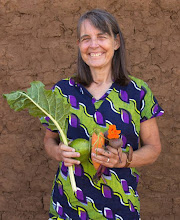Reunions and International
Women's Day Celebrations. . .
Stepping into the luscious African night air under a bright waxing moon was such a treat after a series of long haul flights. It’s hard to believe it has already been a week since I have been welcomed back into the ‘family fold’ of Gardens for Health’s community. Returning to a familiar situation makes sliding back into the routine quite easy. After such a heart wrenching departure just three months ago, it was great to have the balance of a barrage of heartfelt reunion hugs.
The week has been full to the brim; International Women’s Day celebrations, sitting in on meetings with government officials, fine tuning health trainings with the team, getting to know new staff members and birthday surprises have all been part of the mix.
As members of the Bumbogo sector community and advocates for good nutrition, the Gardens for Health (GHI) team participated in the local International Women’s Day on March 8th. This gave GHI the opportunity to explain and demonstrate programs, show the strength of expertise and strengthen ongoing relationships within our local community.
Approximately 1,000 women, men and children from Bumbogo sector sat under colorful umbrellas for protection from the blazing sun to watch a series of special events unfold before them at Musave Primary School’s grounds. Simon Pierre Nsengiyaremye, GHI farm manager, demonstrated local home garden techniques and provided seeds, seedlings and trees from GHI for a garden at the Musave Primary School. The honorary guests, including the Vice President of the Senate and the Vice Mayor of the Gasabo District, participated in the initial planting. They also assisted with planting mango, papaya and orange trees which will ultimately bear fruit for the local school children.
Later the honorary guests toured a small exposition where the best cooperatives and organizations of Bumbogo sector had set up tables to present their products. Claire, one of our health educators, and Simon Pierre presented the GHI table lined with examples of the bountiful harvest including beets, dodo, grains, carrots, seedlings, and potatoes.
Then there were a series of speeches from a long list of special guests including a dynamic young woman who pursued her dream, despite many hurdles, to become an electrician. Her persuasive speech exemplified empowerment as she explained how women are capable of the same work as men. After four hours of festivities the grand finale of the day’s event was a performance of Mama Marceline’s children’s amazing dance troupe comprised of her six sets of twins and two ‘singles’.
A culmination of the day’s events was a GHI farm tour for the honorary guests who expressed great interest in assisting GHI with expansion in other districts in Rwanda. Considering that the Rwandan government is putting forth its National Plan to Eliminate Malnutrition in 2012, GHI’s program becomes especially vital for the well being of Rwanda’s citizens.
There’s plenty of work to be done for the next seven weeks of my stay!
Helen

Quote in the GHI office:
"Ni twebwe muti w'ibibazo byacu."
We are the ones we've been waiting for.

Women's Day audience

Claire arriving with pumpkin

GHI team at Expo

Empowered female electrician

Dancers

Harvesting sunflower seeds

View from GHI

Friday afternoon staff meeting

Isa's photo of sunflowers and potatoes






































